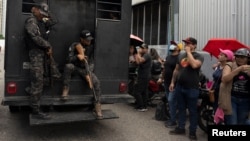Venezuelan authorities have arrested at least nine journalists and expelled 14 from the country in the lead-up to, and immediate aftermath of, contested elections.
Five of those arrests came in the past week, with authorities accusing the journalists of terrorism-related charges. Media workers have also been threatened, injured and expelled, according to data from media associations and free expression groups.
In the most serious incident, a journalist was shot and injured in Aragua state. Elsewhere, spokespersons for national and local governments are reported to have harassed journalists.
The Press and Society Institute, or IPYS, documented at least 79 violations of press freedom between July 29 — the day after the vote — and August 4. Most cases were linked to coverage of the election or protests.
The protests erupted in Venezuela hours after President Nicolas Maduro was declared the winner of the July 28 polls. Human rights organizations say at least 24 died during the protests, and more than 2,200 were arrested, according to Maduro.
Among those arrested was former journalist and prominent opposition figure Roland Carreno.
Espacio Público, an association that promotes human rights and freedom of information, said that both media workers and ordinary citizens have been targeted. In one case, a citizen was arrested over a social media video. In a separate incident, a woman was arrested for writing ‘Freedom’ in flour on a sidewalk.
The Venezuelan government, headed by Maduro, has said a "media" coup is under way and accused the press of participating in destabilizing actions.
Carlos Correa, director of Espacio Público, said Venezuela has had a “dynamic of systemic harassment” against the press since 2014 and that it worsens during election times.
“It is a recurring practice” that seeks to “silence journalistic coverage” and limit the information options of Venezuelan society, he told VOA.
Attacks against journalists have included physical assaults and the use of judicial proceedings, he said, adding that the lack of accountability leads to further abuses.
The government's actions demonstrate a "pattern" of measures that seek to intimidate journalists and restrict media reach in a political crisis following elections, said Andrés Cañizález. The journalist is also a university professor and holds a doctorate in political science.
Among those being held on terror charges are photojournalists Yousner Alvarado and Deisy Pena, cameraman Paul Leon and reporter Jose Gregorio Carnero, according to the Venezuelan Media Workers Union. They have been denied access to a lawyer, it added.
"We denounce the illegal and arbitrary use of anti-terrorism laws in Venezuela, especially against journalists and photojournalists detained during the post-election protests in the country," the union said in a statement on social media.
The crime of terrorism carries a maximum sentence of 30 years in prison in Venezuela.
Venezuela ranks 156th out of 180 on the World Press Freedom Index, where 1 signals the best environment.
Media watchdog Reporters Without Borders, which compiles the index, says that since Maduro came to power in 2013, he has continued his predecessor’s approach, leading to a restrictive media environment and “policies that threaten the existence of independent journalism.”
This story originated in VOA’s Spanish language division. Some information is from Agence France-Presse.
